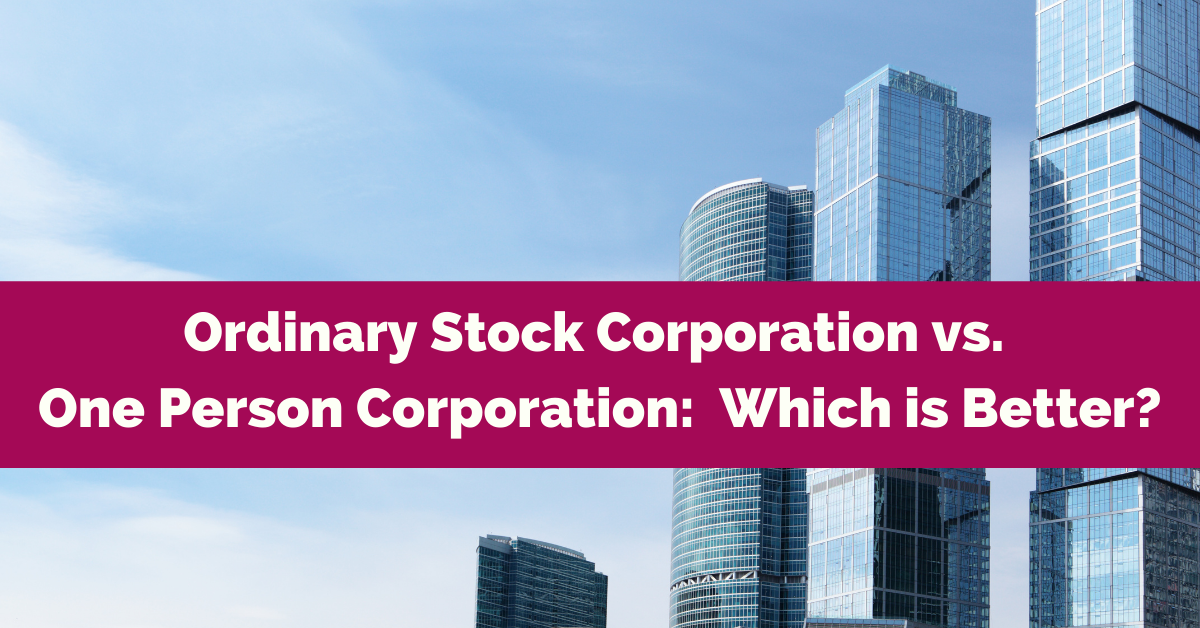Ordinary Stock Corporation VS. One Person Corporation: Which is Better?
More Filipinos are venturing into entrepreneurship. At the time of crisis, our creativity and ingenuity have been unleashed allowing us to provide products and services that can help address the gap and the call of times. Operating our business within the bounds of the law will prevent us from unnecessary headaches in the future thus, registering our business to all government-regulating bodies is a must.
But the process seems daunting to some. The Securities and Exchange Corporation (SEC), for example, requires five incorporators for a corporation to be registered. Gathering the necessary number of business partners is a challenge for business owners, especially if the primary owner intends to be the sole manager of the enterprise.
Moreover, there are other registration requirements which most small businesses cannot comply with. This hinders them from setting up a business organization reflecting the purpose and interest by which they are organized.
Understanding the plight of our businessmen, primarily the micro, small and medium enterprises, the government passed R.A. 11232 or the Revised Corporation Code, which is envisioned to promote entrepreneurship among local and foreign investors and support the ease of doing business in the country.
One Person Corporation (OPC)
One of the significant provisions of RA 11232 is the introduction of a new business setup – the One Person Corporation. Under this new concept, a natural person, a trust, or an estate may form a one-person corporation for any legal purpose such as engaging in business, among others.
This new legal entity works just like a single proprietorship but with limited corporate liability.
Ordinary Stock Corporation (OSC)
In an Ordinary Stock Corporation, the new law retained most of the major provisions, except for some amendments such as the following:
1. Removal of the corporate term limit of 50 years
The Revised Corporation Code (RCC) allows the corporation to exist forever. The company may elect to operate within a specific period, or its existence is limited as specified in its Article of Incorporation.
2. Changes in the capitalization requirements
The new law removed the required 25% capital stock subscription of the total authorized capital stock and the 25% payment of the total capital stocks subscribed.
3. Application for the revival of corporate existence
The SEC allows for the revival of corporate existence for a corporation with the expired term, allowing them a perpetual existence.
One Person Corporation (OPC) vs. Ordinary Stock Corporation (OSC)
The new corporate code requires simple steps to convert an OSC to OPC or vice versa but before we take the plunge, let us examine the benefits of both options.
1. Limited Liability
OPC and OSC are both legal entities. They assumed separate personalities from the shareholders. When the corporation is in default, the creditors may run after the company’s assets only. The shareholder’s assets are separated and protected against creditors.
2. Life Term
In the old corporate code, the corporation is allowed to operate for up to 50 years. This time, a corporation may operate perpetually.
3. Waived minimum capital requirement
Both business types require no minimum capital requirement upon incorporation, except for some industries that are required by law to generate the required paid-in capital.
4. Decision-making
The lone shareholder has total control of the corporation. All corporate decisions are at the shareholder’s sole discretion.
Conversely, in an OSC setup, there are policies to be followed before a decision is made. The board authorizes the President, Board of Directors, and other officers to decide on behalf of the company.
Which is better?
Local and foreign individuals who would like to set up their business in the Philippines should appreciate the gains of the “ease of doing business” policy.
The Revised Corporate Code of the Philippines is aimed at helping small entrepreneurs to make their business transparent and legitimate. When your business is viewed as legal, customers are more likely to do business with you.
At the same time, you can take advantage of this position to get more customers, land more contracts or explore other markets.
As to the question, which is better? Both business structures are helpful depending on the purpose and intent of the corporation.
One Person Corporation is ideal for a start-up business, for those whose objective is to run their own company without the associated risk of incurring personal liabilities or dealing with many business partners.
Some business owners prefer Ordinary Stock Corporation if the business is enormous and the management of the day-to-day affair needs a team of managers to guarantee that the company achieves its targets.
In the end, the decision to embrace an OPC or OSC type of organization is dependent solely on the stakeholders who will assume the possible risk associated with their choices.
Please visit SEC’s website to know more about RA 11232.
We can help you register your business
Registering your business requires a lot of paper works and endless queues. But you don’t have to worry! We can help you register your business! Just email us at info@djkaaccounting.com or send us a message on Facebook: https://www.facebook.com/djkaaccounting for your business registration and licensing needs.
Related Posts
Recent Posts
- New Features and Functionalities of the Online Registration and Update System (ORUS)
- A Comprehensive Guide to Taxation for Freelancers in the Philippines
- New Tax Laws in 2024: What Changes Filipino Taxpayers Should Prepare For
- How to Avoid Common Tax Mistakes in 2024
- Tax Deductions and Benefits Often Overlooked by Filipino Taxpayers





